Shokz OpenFit


The Shokz OpenFit do deliver on that promise of bigger sound compared to Shokz’s bone conduction headphones but the hanging ear hook design, steep price and battery performance means there’s room for improvement.
Pros
- Big, customisable sound
- Quick charge support
- Easy to use companion app
Cons
- Earhook design doesn’t always feel super secure
- Touch controls during exercise
- Picey
Key Features
- DirectPitchFires audio into ear
- Dolphin Arc Ear HookErgonomic design that fits shape of the ear
Introduction
The Shokz OpenFit sees Shokz ditch its bone conduction approach for an air conduction setup to deliver bigger open-ear sound by planting speakers in close proximity to your ears to deliver that sound.
Along with a change in the audio, it’s all change in the design department as it moves away from its regular neckband-style look.
Those changes and promised audio improvements make the OpenFit the priciest pair of headphones in the Shokz collection. So do they justify the bigger spend and do deliver that solid Shokz performance? Here’s my take.
Availability
The Shokz OpenFit are priced at £179 / $179.95 making them the most expensive headphones in Shokz’s collection and roughly £20 / $20 more than its OpenRun Pro bone conduction headphones.
That does make them slightly cheaper than air conduction headphones like the Cleer Audio Arc II Sport (£199 / $199) but pricier than headphones like the Soundpeat RunFree Lite and the Sivga SO1, which both come in well below the £100 / $100 price mark.
They’re also more expensive than traditional sporty truly wireless earbuds with ear hook designs that have impressed us like the Soundcore Sport X10 and JBL Endurance Peak 3.
Design
- IP54 water resistance
- Touch controls
- Weigh under 9g (per earbud)
The OpenFit is a huge departure from the usual Shokz headphone look, swapping a titanium alloy neckband frame for a set of earhook earbuds that sit inside a charging case when not in use.
Each earbud weighs 8.3g, so heavier than a pair of Apple AirPods Pro 2 and uses what Shokz calls a Dolphin Arc earhook design, wrapping a flexible hook over the top of the ear to keep it securely in place. Those are attached to what are speakers that fire sound towards the ears. The earphones can be used independently as well.
It carries an IP54 water resistance rating, giving them some protection against sweat and rain. It isn’t the strongest level of protection Shokz offers, but it does give a welcome level of durability. The accompanying USB-C-powered charging case doesn’t offer the same level of protection against moisture, however.
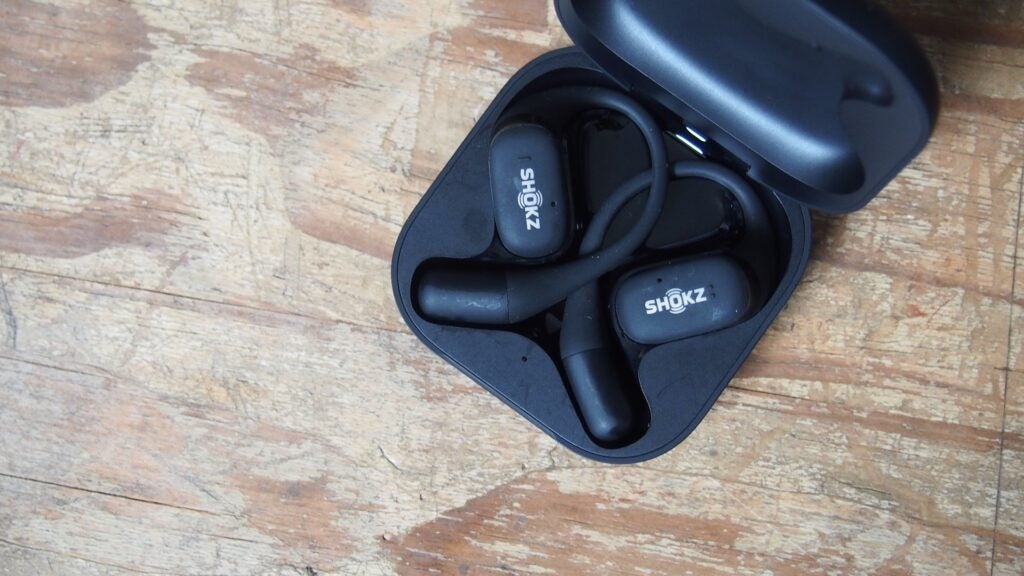
On top of those earbuds lie touchpads, which sees another change from the physical controls Shokz uses on its bone conduction headphones. Those touchpads can be double tapped and pressed and held to activate features like skipping tracks, playing and pausing music as well as decreasing and increasing volume.
There’s also room for dual noise cancelling microphones to handle calls which use AI noise cancellation technology that, according to Shokz, deliver clear call quality.
Wearing the OpenFit has been an interesting experience. I’d say the overarching feeling is that it feels like the main speaker section hangs near the ear in precarious fashion. That’s fine when sitting down, but I found during more rigorous and sweaty exercise I had to adjust the ear hooks and the earbuds as they felt like they were moving around.
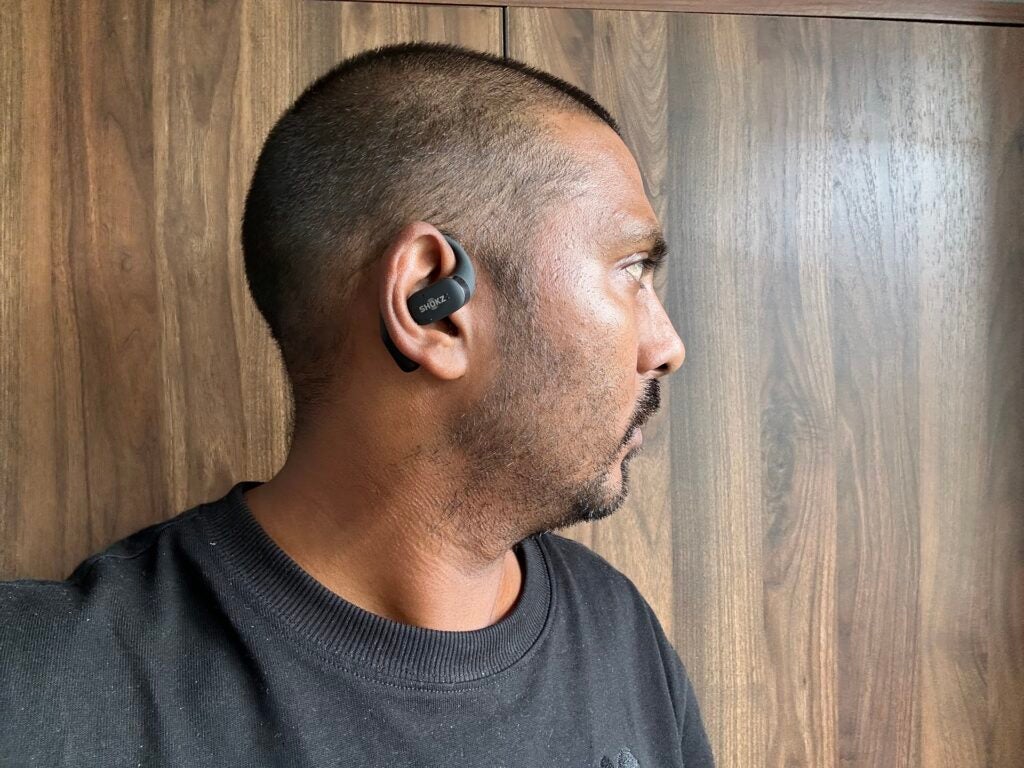
They never fell off, but the design creates the sense they might. It feels like there’s an issue with the weight and balance of weight between earhook and the main earbud element. I’ve tried other open ear speaker-style headphones before like the Cleer Arc and they felt more secure than the OpenFit.
The touchpad-based controls are some of the better integrated touch controls I’ve used on a set of earbuds. They’re simple to use and can be customised within the Shokz companion phone app. They’re not perfect if you’re on the move, but for most scenarios, once you learn the sweet spot, it’s nice to adjust volume or skip tracks. They can certainly have their frustrating moments as well and that’s why physical controls are generally still great on headphones.
Features
- Up to 7 hours battery life
- Quick charge mode
- Decent call quality
Despite being the most expensive pair of Shokz headphones, they don’t promise the biggest battery. Shokz says you should get up to 7 hours battery life, which is short of the 10 hours off a single charge from the OpenRun Pro. You can get a total of 28 hours when you factor in a fully charged charging case, plus a 5-minute charge gets you an hour of listening time.
What those battery numbers don’t illustrate is performance at different volumes or when using more powerful EQ modes. I found an hour at close to maximum volume using the Bass Boost EQ mode saw battery drop by 30-40%. That would equate to significantly less than the claimed 7 hours battery.
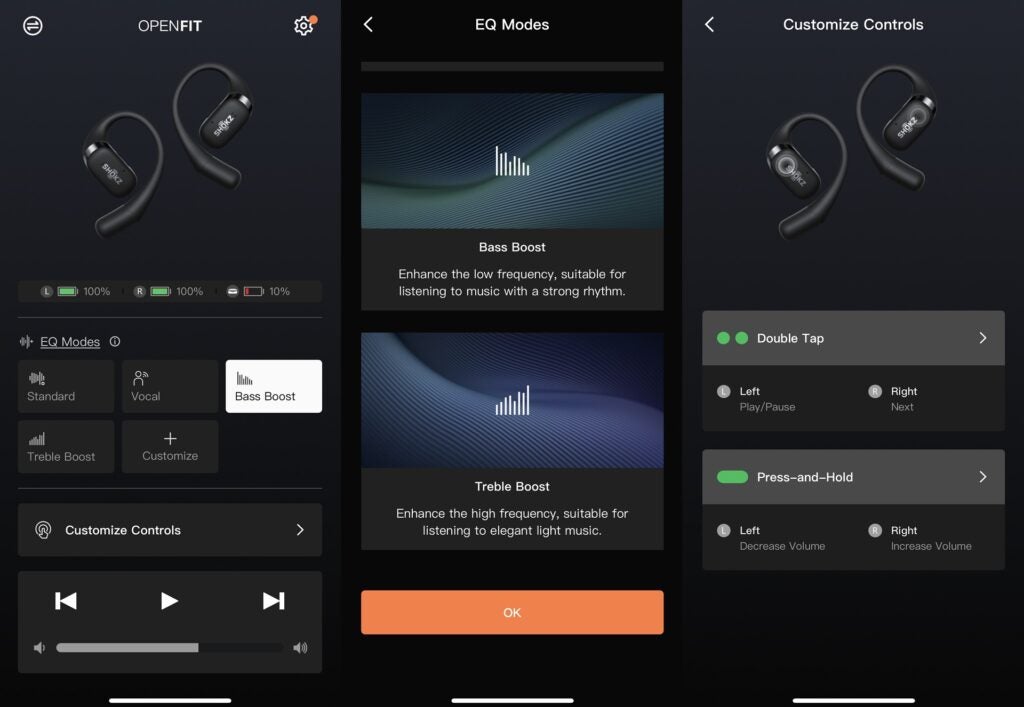
Volume clearly has an impact as it does on Shokz’s bone conduction headphones, but EQ support drains things further based on my testing. That makes the quick charge mode an important feature, the earphones sit securely inside a charging case that’s pretty pocket-friendly with an indicator light to show the amount of battery left.
Handling calls is pretty solid on the whole, but much like bone conduction headphones, the quieter the environment the better the performance. The AI smarts Shokz includes will benefit those on the other end of the call, but if you’re using them in louder environments they’re still going to suffer for volume.
Sound Quality
- Big sound with in-app EQ modes
- Not the most balanced presentation
Shokz calls the technology that sit in close proximity to your ears it its DirectPitch, which aim to minimise the kind of sound leakage you get from bone conduction headphones, but also don’t block up the ears like traditional in-earphones. It’s not a new approach, but it’s new to Shokz and claims to offer a balanced sound and bigger bass performance.
That change in approach brings the ability to customise that sound from the Shokz companion app, which is available for both iPhone and Android users. I used the iPhone version, which keeps things simple and has a clean look that makes it nice and straightforward to deal with. This is where you can pick from four different preset EQ modes or create your own.
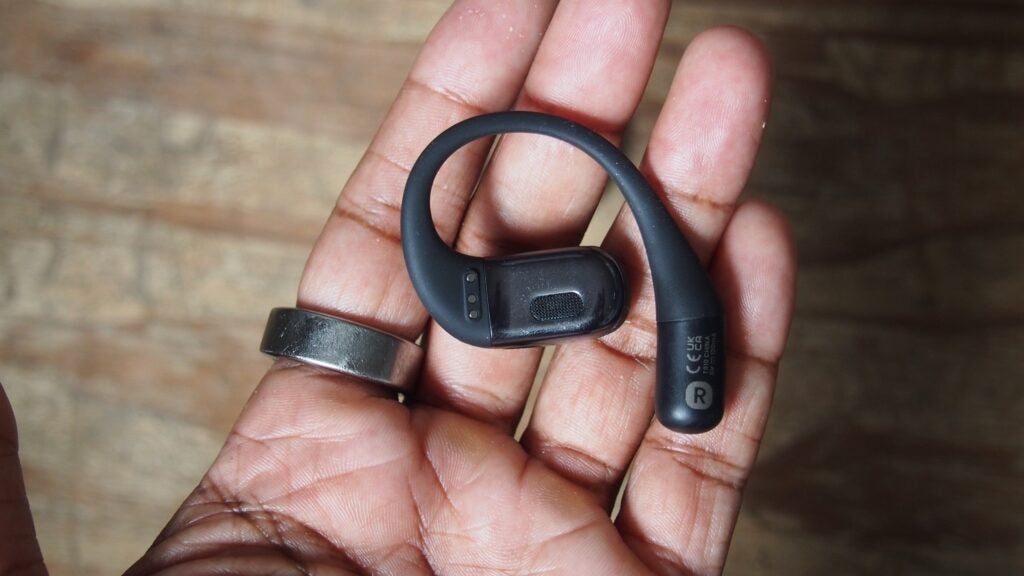
Now I’d say Shokz delivers on that promise of bigger sound, though I do think it comes at the expense of the more balanced profile you get from its top-end bone conduction headphones. When using them outside, like other Shokz headphones, you often need to get them up loud to get the best out of them. It’s still about finding a balance between your sound and noise around you, and it depends on how much sound you’re competing with. If you’re out on a quiet walk it works pretty well. Head out for a run in a busy part of town, and it’s more challenging to deliver good results.
I played around with all of the EQ modes, and you can get something enjoyable. Dropping into ‘Standard’ and ‘Bass Boost’ modes on Massive Attack’s Unfinished Sympathy and you get that very noticeable thud of bass and general upping of overall warmth that Shokz’s other headphones struggle to deliver. Though opting for the Bass Boost mode is where things can sound a little less balanced and muddy, particularly at the top end where the mids and trebles are less prominent Erykah Badu’s On and On.
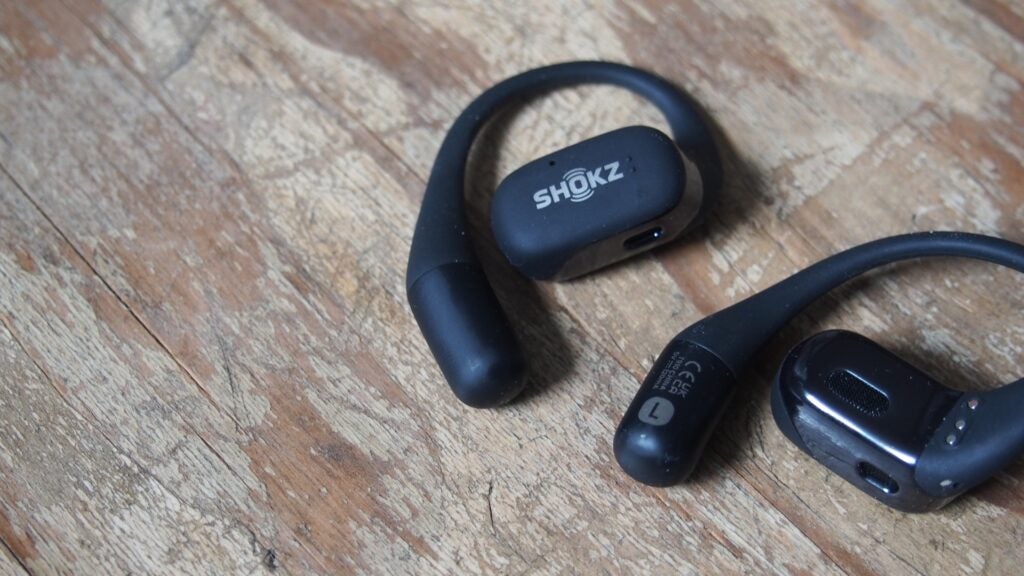
Tracks like The Avalanches Since I Left You have a really pleasing quality. Switching to something more vocal-centric like London Grammar’s Wasting My Young Years and you can opt for the vocal or treble boost modes to clear things up and overall get good sound for most audio here. You’ll just need to play around and accept you’re not going to get the kind of sound performance to rival conventional true wireless earbuds.
Latest deals
Should you buy it?
You want earhook headphones with big sound: The OpenFit gives you Shokz headphones that offer a more powerful, bassy sound than its bone conduction headphones.
You want the best earhook headphones for exercise: The earhook design on the OpenFit for some exercises makes them less suited to some exercises compared to Shokz’s neckband-style headphones and other traditional earhook sports headphones.
Final Thoughts
The Shokz OpenFit is an interesting move from a headphone maker that’s already a popular choice for fitness fans and those who want a much safer way to listen to audio. Ultimately though, the OpenFit feels expensive and I’m not convinced the earhook design is well built for all scenarios. Especially ones that are sweatier and more rigorous.
How we test
We test every set of headphones we review thoroughly over an extended period of time. We use industry standard tests to compare features properly. We’ll always tell you what we find. We never, ever, accept money to review a product.
Find out more about how we test in our ethics policy
Tested for more than a week
Tested with real world use
FAQs
The OpenFit don’t support Bluetooth multipoint, therefore they can only be paired with one device at a time.
Full specs
The post Shokz OpenFit appeared first on Trusted Reviews.
Source Trusted Reviews ,Home Appliances Reviews




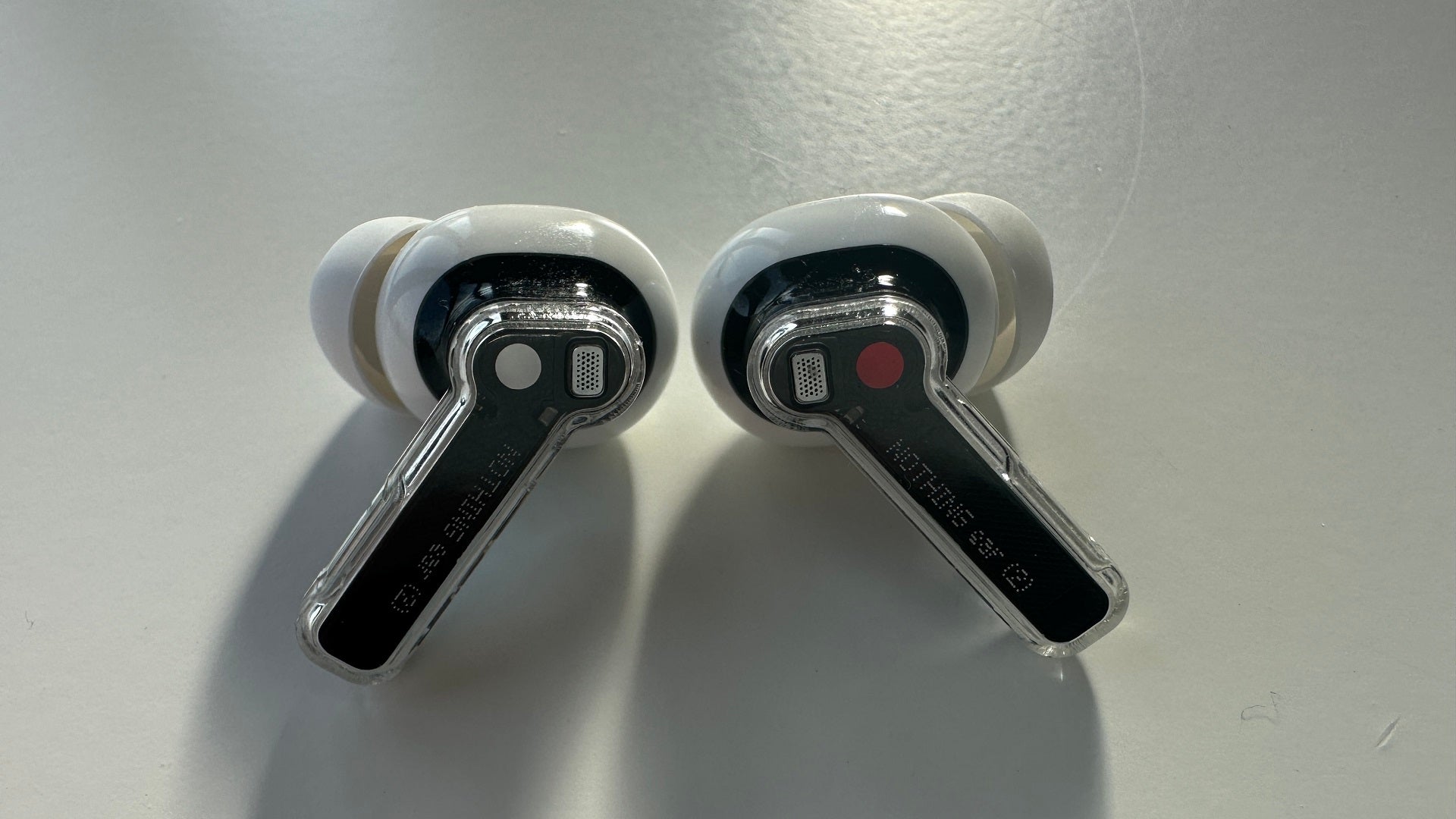


No comments